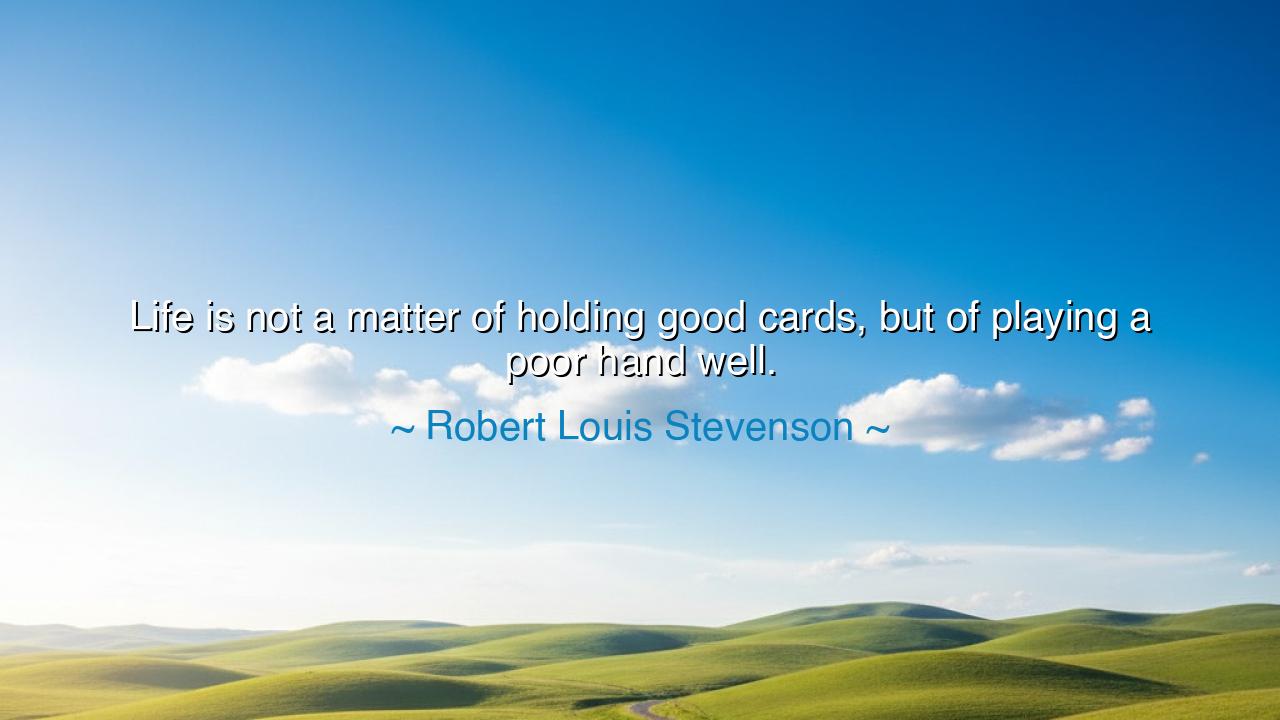
Life is not a matter of holding good cards, but of playing a poor






Hear, O children of fortune and trial, the voice of Robert Louis Stevenson, who declared: “Life is not a matter of holding good cards, but of playing a poor hand well.” In this saying lies a truth both humbling and heroic—that the measure of a person is not found in the gifts they receive at birth, nor in the comforts fortune grants, but in the courage and wisdom with which they use what they are given. For many will be dealt a hand of hardship, yet from that hardship can arise greatness, if only it is played with skill, endurance, and heart.
The origin of these words springs from Stevenson’s own life, for he knew intimately the trials of a frail body and the storms of ill health. Afflicted with lung disease, wandering across seas in search of air fit for his breathing, he was not granted the “good cards” of robust strength or ease. Yet he wrote works that endure across centuries, tales of pirates, adventurers, and seekers of treasure, filling the hearts of young and old with wonder. By playing his poor hand with brilliance, Stevenson proved his own teaching true: adversity does not define destiny, but response does.
The ancients too taught this wisdom. The Stoics declared that life is not in our circumstances but in our choices. Epictetus, born a slave, crippled in body, yet strong in spirit, taught that freedom lies not in what is dealt to us, but in how we meet it. His voice, like Stevenson’s, reminds us that greatness often arises not from those who had the strongest beginning, but from those who endured the hardest journey and yet stood unbroken.
Consider also the story of Franklin D. Roosevelt, who, though struck by polio and confined to a wheelchair, rose to lead a nation through the Great Depression and the storms of World War II. His hand was poor in health, yet he played it with vision, courage, and determination. His voice over the radio brought hope to millions. His actions, limited in body but not in spirit, shaped the fate of the free world. Thus, as Stevenson declared, the worth of life lies not in what we hold, but in how we wield it.
The meaning of Stevenson’s words is both comforting and convicting. If you were not born with wealth, strength, beauty, or ease, despair not—for your hand, however poor, may yet be played with nobility. And if you were born with abundance, remember: the hand itself does not make the victor. Even the finest cards can be wasted by the careless, while even the weakest hand can triumph through wisdom, courage, and perseverance. Character, not circumstance, shapes destiny.
The lesson for us is clear: embrace your hand and play it well. Do not curse your hardships, for they may yet teach you endurance. Do not envy another’s abundance, for their strength is not your path. Instead, take what you have—be it little or much—and use it with faith, creativity, and resolve. The one who does this will find themselves richer than kings, for their life will shine with the glory of resilience.
Practical steps lie before you: Each day, name not what you lack, but what you hold, however small, and seek how best to use it. In hardship, ask not “Why me?” but “How can this be used for good?” In opportunity, do not boast of your good cards, but play them humbly, remembering that many have triumphed with less. And when despair tempts you, recall that the heroes of history were often those dealt the poorest hands, yet who lived the noblest lives.
Thus remember the teaching of Stevenson: life is not about the hand you are dealt, but how you play it. If you live by this, no trial will overcome you, no lack will diminish you, no weakness will chain you. For though your hand may seem poor, your spirit can make it rich, and your life, though fragile, can blaze with immortal strength.






AAdministratorAdministrator
Welcome, honored guests. Please leave a comment, we will respond soon